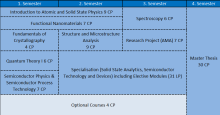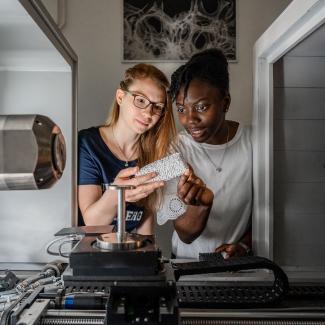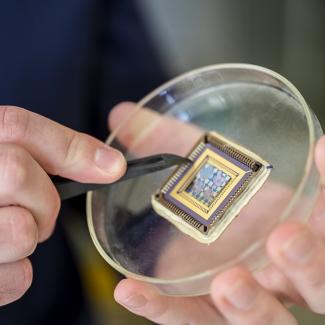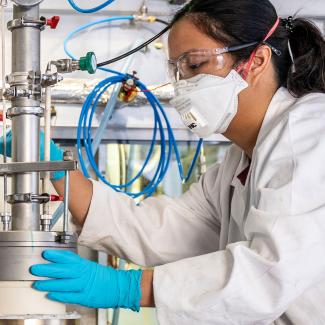Advanced Materials Analysis
The targeted development of new materials (materials design) and the manufacture of components/construction elements with the desired properties require a combination of academically motivated and application-oriented research that deals with the description of functional relationships. That is why scientists with in-depth knowledge of instrumental solid-state analysis and semiconductor technology are in constant demand in academia and industry.
The Master's programme in Advanced Materials Analysis is aimed at graduates of Bachelor's programmes in physics, materials science, electrical engineering or chemistry who wish to deepen their education in the use of instrumented materials analysis methods, physical measurement methods and/or semiconductor technology.
From the second semester onwards, students can choose one of two specialisations:
Solid State Analytics
The specialisation in solid state analytics focuses on the structural and microstructural analysis of mainly inorganic materials (semiconductors, ceramics, metals and their alloys) for electronics, sensor technology, optical applications and energy systems. The most important analytical methods include electron microscopy, spectroscopic methods and diffraction methods. A unique feature of the programme are courses on synchrotron sources and free-electron lasers and their use in in situ analyses of fast processes in modern materials.
Semiconductor Technology and Devices
The specialisation ‘Semiconductor Technology and Devices’ focuses on imparting knowledge of semiconductor process technology, i.e. how semiconductors are processed in order to manufacture components. On the other hand, it teaches the physical functioning of various components from the fields of electronics, optoelectronics and photovoltaics in theory, simulation and practice. Furthermore, it introduces the electrical, optical and structural measurement methods that can be used to investigate the structure-property relationships, for example in relation to atomic point defects and their influence on component behaviour.
Good to Know
Please note that this is an English-language Master's degree programme. Applications can be submitted online via the university portal and are possible from 1 January to 15 April.
- Faculty
-
Faculty of Materials Science and Technology (Faculty 5)
- Degree
-
Master of Science (M. Sc.)
- Standard period of study
-
4 Semester
- Part-time possible
-
No
- Start of studies
-
Winter semester
- Admission requirement
-
- Bachelor's degree (at least 6 semesters) or an equivalent degree in materials science, physics, chemistry, electrical engineering or engineering with a focus on materials science, which should include topics from the field of solid-state physics or solid-state chemistry.
- Qualification assessment procedure (including online test in mathematics and physics)
Please note: Applicants with a degree in "Mechanical Engineering" who have not taken any of the above-mentioned specializations during their studies cannot be admitted for technical reasons.
Language skills- English skills - TOEFL with at least 90 points (internet-based test) or
- IELTS with at least 6.5
English as a native language will be counted as equivalent.
- Course language
-
English
- Materials analysis
- Quality control
- Semiconductor industry
- Ceramic industry
- Composite material manufacturers
- Metallurgy
- Research institutes
Requirements
Admission requirements
Bachelor's Degree
The Master's degree course in Advanced Materials Analysis is only open to students who have completed at least six semesters of a first professionally qualifying degree at a university
- in a degree course with a focus on materials science
- in a degree program with an engineering focus with proof of knowledge of materials science or
- in a physics or chemistry degree program
has.
Please note: Applicants with a degree in "Mechanical Engineering" who have not taken any of the above-mentioned specializations during their studies cannot be admitted for technical reasons.
Language Skills
Proof of English language proficiency through a recognized language test such as the Test of English as a Foreign Language (TOEFL) with at least 90 points (internet-based test) or the International English Language Test System (IELTS) with a score of at least 6.5 or an equivalent test with a corresponding score is also an admission requirement. English as a native language is recognized as an equivalent.
Personal requirements and Interests
Curiosity and interest in natural sciences
Reasons for the Advanced Materials Analysis Master's Program
TUBAF is a small university with a close connection between scientific and engineering disciplines and a strong focus on materials science.
Students study in small groups and are supervised directly by the lecturers.
Students can choose basic or practical subjects and gain further experience through TUBAF's collaboration with Saxon research institutes and industry.
Contact for further Technical Questions
If you have any further technical questions, please do not hesitate to contact Dr. Dirk Renker or the Dean of Studies, Prof. David Rafaja:
Frequently Asked Questions (FAQ)
What numerus clausus (NC) do I need to study at TUBAF?
All Bachelor's and Diploma degree programs at TUBAF are admission-free, i.e. there is no NC. The only decisive factor is your university entrance qualification (e.g. Abitur). The Master's degree programs also have no admission restrictions - however, we recommend that you take a look at the respective admission requirements for the degree program. These can be found in the requirements section and in the study documents.
How long does the Advanced Materials Analysis course take and when does it start?
The standard period of study is 4 semesters. 120 credit points must be achieved.
The course begins in the winter semester.
Who do I contact if I come from abroad?
The International Office can help you with questions about your studies - such as application or enrollment. TUBAF offers a Buddy-Program for first semester students moving to Freiberg from abroad.
The Central Student Advisory Service and the subject advisory service of the respective faculty (see info box at the top of the website) can help with questions about specific courses.
Where can I find information on student finance and housing?
Information on the topic of financing your studies is summarized on the website Study financing.
We have collected information on the subject of housing here.



